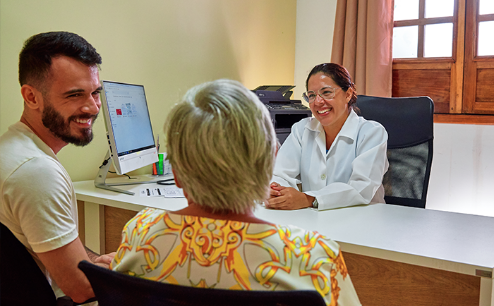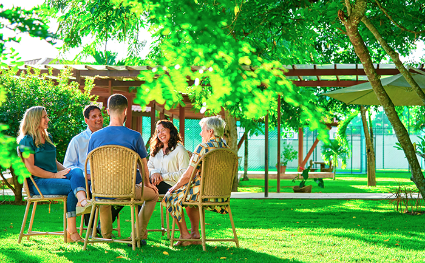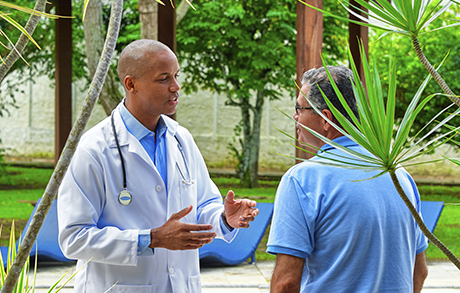There are crucial moments in life, which ask us for a new direction. You know you need to change, find balance, and finally feel at peace. Living fully and having a sense of purpose so that everything makes sense becomes essential.
Novo Nascer is the place for people who need to make this change in the best possible way. We offer multi-professional care, precise guidance and a warm welcome, walking with you on this journey of necessary changes.

Our treatment takes care of you fully. This 360º look at the person allows us to understand them emotionally, physically and psychically. We deal with behavioral addictions as well as disorders such as depression, bipolar disorder and suicidal behavior. If you want to talk privately with a member of our team, just get in touch:
See the list of what we treat:
During your stay at Novo Nascer, you will be in an environment full of well-kept gardens, majestic trees and fresh air, in addition to a whole hospital infrastructure to meet all your needs. We want you to feel comfortable both for the beautiful environment and for the security of our structure.
How we treat

No person is like another, and our treatment is a perfect way to reflect that reality. We see each person individually and completely, going well beyond the issues that have brought them here. That is why we combine traditional and alternative methods, forming a team of more than 150 professionals, in different areas, to understand and treat you with the best there is.
Also known as essential oil therapy, Aromatherapy is a full-action treatment for the individual, using natural plant extracts to promote health and well-being. It acts on the body and also on the individual's emotional.
More InformationArt therapy integrates psychotherapeutic techniques and the creative process to achieve improvements in mental health. It can be used to increase the patient's cognitive capacity, as well as self-esteem, self-awareness and resilience.
More InformationIn ADL sessions, patient independence is the main objective. Self-care, often overlooked when we face some imbalance in mental health, involves frequent care with personal hygiene. AVD also includes the act of dressing and putting on shoes, mobility and food.
More InformationWithout contraindications, Auriculotherapy accesses points in the ears in order to treat various issues of physical, mental and emotional health. With approximately 200 auricular points, Auriculotherapy is a tool with proven results, including in the field of addictions and in various emotional disorders.
More InformationRelieving pain and increasing the level of relaxation are the main gains for those who practice the Biofeedback technique. It is through the increase in self-awareness of physiological functions, which are usually beyond our control, that the technique achieves its goals.
More InformationFamily Constellation is a psychotherapeutic approach that takes into account behavior patterns that are repeated over generations. The technique works from the understanding that every human being belongs to a system, to a family.
More InformationAlso known as Scheme Therapy, this technique that extends traditional cognitive behavioral therapy distinguishes five basic and universal needs in each individual. Thus, it investigates issues initiated in childhood, which later become some type of non-adaptation, so that treatment can reach their cause.
More InformationThe technique can either be used directly for pain relief in general, or in a more comprehensive action, involving the understanding of emotions, improving self-esteem and solving other emotional challenges. Also called Tapping, it is an emotional version of acupuncture, using verbal language to 'clear' emotions with the aid of “tapping” on specific parts of the body.
More InformationThis technique is especially useful for people who have an impasse in their ambivalence for their personal growth. Being part of the human condition, ambivalence makes it difficult to compromise behavior change, a central theme, therefore, when it comes to chemical, alcoholic or any other addiction.
More InformationThere are countless studies that prove the efficiency of exercising the Spirituality of treatments in the mental health area, being recommended even by the World Psychiatric Association. Regardless of religions, recognizing that there is a superior moral, affective and intellectual force that governs and protects us, is part of the recipe of those who want to achieve balance in life.
More InformationPushing, crouching, jumping, running and other movements are natural to humans. These are the tools used in Functional Exercises, adding balance and weight to the body to work all muscle groups at the same time.
More InformationMindfulness is a basic human ability to be fully present in a given activity. Bathing, tidying the room, cooking or any other daily activity can be an opportunity to develop awareness of what is being done, paying attention to the emotions and thoughts aroused by the action. Thus it focuses on the moment in which one lives and not the past or the future, which feeds anxieties or frustrations.
More InformationMusic therapy uses music therapeutically, with the aim of developing the person emotionally and affectively. The rhythm eases everyday anxiety, stress and insomnia and stimulates creativity. Physically, the technique activates touch and ear, blood circulation, breathing and reflexes.
More InformationNeurofeedback is a non-invasive form of conditioning brain activity. During a Neurofeedback session, what your brain is actually doing is compared to what the person would like them to be doing. Neuronal responses are trained to build healthier patterns, using video games, music, or even movies and videos.
More InformationNeuropsychology studies characteristics of behavioral changes resulting from trauma or neurological conditions. It can aim at both functional restitution, taking advantage of neuronal plasticity, as well as preserved cognitive skills and strategies.
More InformationAsanas Yoga postures help to improve mental and physical balance, also cleaning organs of the body. They have the ability to provide energy to strengthen the immune system and fight diseases, in addition to preparing the person to improve the performance of their daily activities, encouraging good eating habits, thoughts and also conduct.
More InformationBreathing here has three specific functions: increasing the level of oxygen in the blood, controlling vital energy (prana) and mastering the mind and emotions. As we begin to practice, the breathing mechanism becomes more and more conscious and we are increasingly able to fully access our capabilities.
More InformationBioenergetics is a type of mind-body psychotherapy: if anything affects the body, it also affects the mind and vice versa. People with depression, for example, tend to maintain a hunched forward posture with rounded shoulders. In this case, the therapist will work on precisely those points that are a reflection of their mental state. The result goes beyond posture, therefore, also reaching your emotional aspect and helping in the rehabilitation of their mental health.
More InformationCognitive-Behavioral Therapy (CBT) is based on the hypothesis that cognitive weaknesses result in models of emotional issues. It assumes that our representations of internal and external events - and not the event itself - determine emotional and behavioral responses. How we do information processing, therefore, is the target of CBT research and treatment.
More InformationPerformed exclusively by psychologists, it is based on the way the patient interacts with the therapist and how he develops this relationship similar to the way they relate to other people and situations in daily life. The therapist makes interventions during the consultation, bringing the patient's own complaints and reinforcing behaviors to improve their condition.
More InformationThe relief of suffering and the patient's psychological well-being is the objective of psychiatry, one of the medical areas that has been evolving the most in Brazil and in the world, also due to the growing need to offer specialized services in mental health. Psychiatry is guided by international parameters, such as ICD-10 from the World Health Organization and DSM-V from the American Psychiatric Association. Psychiatric evaluation involves examining the mental state, the patient's clinical history, as well as psychological, neurological, neuropsychological tests and imaging tests, which can be used as aids in the evaluation, as well as physical and laboratory tests.
More InformationThis ancient Chinese technique is known for its slow movements, practiced in silence, which provide a balanced movement of the body's energy in addition to working on body awareness, concentration and tranquility.
More InformationThe model of humanized care and centered on the individual also involves environment and nature, thus, has a central role in the treatment. Being more connected with the healing powers of nature, whether interacting, contemplating or just living with it, directly helps in the search for mental and physical balance.
More InformationThis natural treatment has a relaxing action by providing greater oxygenation in the body's tissues and also releasing toxins from the body. The suction cups create a vacuum effect when sucking the skin and, thus, increases the diameter of the blood vessels in that location.
More InformationThere are different techniques of Contemplative Meditation that offer us new sources of perception about life and spirituality. Developing the techniques offers the mind greater freedom, being less dominated by external elements and our reactions to these events.
More Information
We help family members on their journey to overcome
We know the strength and courage necessary to ask for help, to take a significant step in the treatment of the loved one. That is why we are also available to family members, from the first contact. We offer individual consultations to fully understand what is going on, visits accompanied by therapists and family groups, so that the treatment process becomes more harmonious.
By getting to know the patient better and giving all the support to the family, we improved the communication channel between both parties and promoted a higher level of understanding, which is essential for the return home.
Check the list of frequently asked questions to the clinic, as well as Novo Nascer's answers about our facilities, treatments and diseases.
Visit the FAQ page